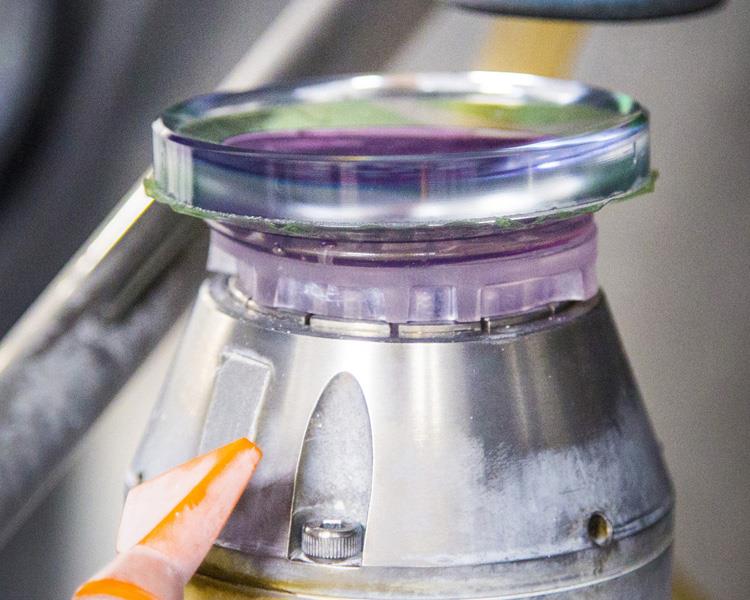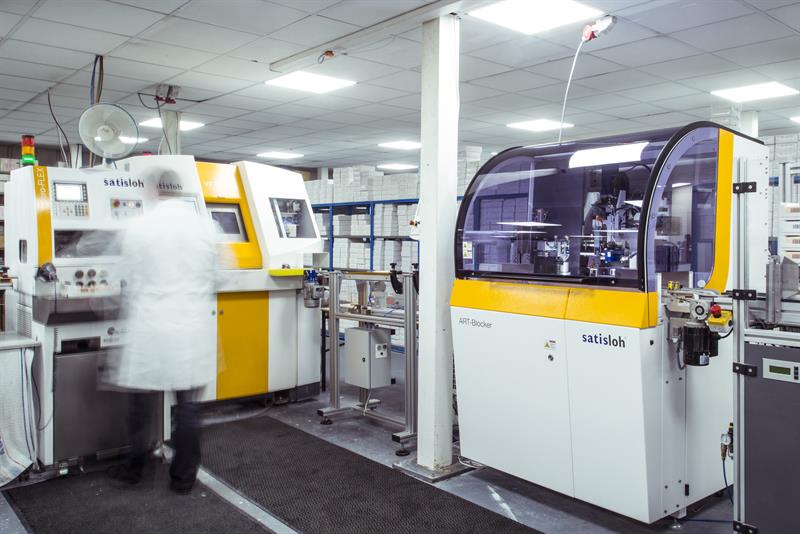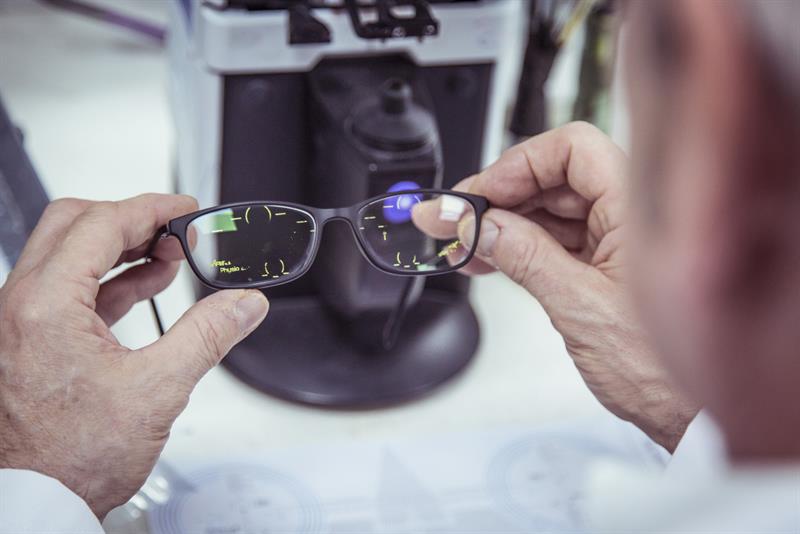Optician last visited Dunelm Optical’s multi-purpose facility in Spennymoor, County Durham, back in 2012. On that occasion general manager Graham Carter, when asked about the future of the lab, envisaged the adoption of freeform as the next step forward.
Returning at the start of 2017, Dunelm has made good on this plan thanks to significant investment in the relevant machinery over the past two years, over which time period staff have worked successfully to integrate and optimise its use.
‘The demand for freeform made the investment necessary,’ says Carter. ‘Surfacing technology has changed dramatically compared to glazing technology in recent times. The development of different lens designs and the machinery needed to do them becoming more affordable has allowed us to make sure we are not reliant on big companies.
‘There was a clear business case for investing that money,’ adds Peter Beaumont, managing director at Dunelm Optical. ‘It gives us the ability to turn simple lenses into freeform multifocal lenses in different designs.’
The lab already possessed a VFT Satis Loh generator, capable of driving a freeform operation, and Dunelm returned to the German manufacturing equipment firm once more.
‘Since we had the generator, it made sense to explore options with Satis Loh,’ says Beaumont. ‘We chose to add an ART blocker, Toro-Flex soft polishers and ART deblocker altogether valued at over £300,000. We made the purchase two years ago but it took time to develop; it was last summer that we really had it firing.’
Setting up and optimising the new machinery was something of a challenge.
‘It was a complicated process to make machines work,’ says Carter. ‘The biggest sticking point was integrating the Satis Loh machines into the software that runs the lab. The machines were so new that no one had done it previously. In physical terms working out how best to position the machines and organise the flow of work took a while. We put the conveyor belt system that runs between the machines in ourselves and synchronised it with the machines to have a steady workflow with no build-up points.’
While still offering any lenses on the market as desired by a client, Dunelm’s own freeform lenses are branded as Spectre and supported by marketing material. The company advises it offers a very significant saving over other similarly performing products.
More recently the lab has also added a Xtrimer SE1 edging machine, a significant recent addition to the market from Nidek.

‘The speed accuracy and capability for remote edging offered by the Nidek machine has been very successful and complements our freeform offering,’ says Carter. ‘Just the range and quality of jobs it can do from three piece rimless to supras. In particular high base wraps at complex prescriptions are when it stands out at providing excellent work. It is more accurate and has a higher quality finish than you would get with a standard machine. This makes a difference to the service we are able to provide.’
Dunelm has signed up to a service contract with Satis Loh and Nidek that means all the machines are constantly upgraded as new innovations are brought to market.
‘For example, this morning the VFT generator has had a replacement on it that fully automates the head cleaning system,’ says Beaumont. ‘They are updating our generator to the latest model all the time – as soon as an advance is ready for industrial use it is put in. The suppliers can also access the machines remotely, update the firmware and make adjustments to the setup. If you get in touch with a problem they can go through a troubleshooting procedure.’
All together the new machines add up to significant improvements for Dunelm’s customers.
‘Production is much faster now and the fact we are self-sufficient means we don’t risk a supplier failing to deliver a quality product in timely fashion and ultimately letting down a customer,’ explains Beaumont. ‘We control the whole process and make sure everything is done as quickly as possible. Production costs are lower while quality is higher. You can actually feel things moving through the lab in a much smoother fashion now and we are looking to increase the volume of lab work coming through.
‘We are making this push on the basis that we are an independent lab for independent practices, which does make us stand out against some of the other options in the lens market.’
With its extensive premises, expensive modern equipment and presence in both the frames and lenses markets Dunelm has come a long way since its inception.
‘Dunelm Optical was set up by my [recently retired] brother Tony Beaumont and myself 48 years ago in Sherburn Hill, to the east of Durham,’ says Beaumont. ‘My grandfather opened a practice in Huddersfield and my father subsequently ran a practice called Cameron Beaumont’s in Leeds. Of his three sons, the eldest Tony and myself set up Dunelm Optical. My other brother took over the Cameron Beaumont practice, which is in Wetherby, and his children still run it today. However, we have no ties to that or any other retail outlet whatsoever.’
Attracted by government grants available at the time in the area due to coal mines closing, Dunelm Optical was formed as a lens supply business but after five years started providing frames too due to high demand.

Dunelm’s Satis Loh ART Blocker
In time the company outgrew the old chapel it was operating in and moved to the current premises in Spennymoor some 25 years ago.
‘We left Sherburn Hill because we did not have space for surfacing,’ says Beaumont. ‘Originally we just had the downstairs here but doubled in size by taking the upstairs unit eventually for a total of 30,000 square feet. We have the option of taking one of the next door units in the future should we need it but there are no plans for that at the moment.’
Today Dunelm has 85 employees split between the Spennymoor site for lenses and frame distribution, and a frames case factory in Yorkshire. Of the 70 people employed at Spennymoor roughly half work on the lens side of the business with some 11 involved in lens manufacturing and another 14 on the glazing side, all backed up by myriad office staff, accounts, product reps and drivers. There are hundreds of years of experience among the various staff on the lens side, including Carter who joined Dunelm only a few years into the company’s life.

‘Back then it was all glass and I was shown how to crimp the lenses,’ says Carter. ‘There’s been massive changes since then, from glass to acrylic to plastic and all the different indices which weren’t available before. It was a highly skilled job to glaze glass into a metal frame and rimless. Skill factor has dropped a lot with the machinery and material but the quality freeform product we can manufacture in a short space of time now is amazing.’
Of course Dunelm is very well known across the UK and internationally for it frames operation, which offers specific advantages for the lens side of the business.
‘We offer frames and lenses packages that people can order all in with the benefit of keeping the frames on display and having a new pair cut, edged and glazed by us,’ says Beaumont. ‘The advantages of combining a frames and lenses operation include speed, service and the ability to do any lenses. One stop in house is much simpler and therefore quicker and more reliable. The cost of service is improved as well in general due to streamlining.
‘We want to make things as quick, simple and value for money for our independent clients so they can continue competing with the multiples on the high street.’
Looking once more to future, Carter affirms the lab will continue to develop,
‘Ultimately we are always interested in upgrading our machinery in order to reduce costs for our clients,’ he says. ‘We may consider robotics to feed the SE1 or perhaps add another line of polishers. In this line of work it is very important to keep moving on, you have to in order to stay in business.’
